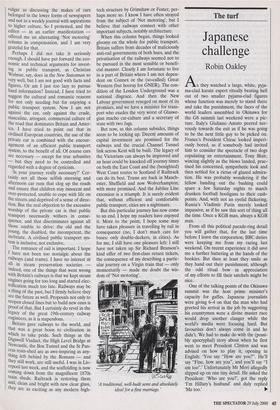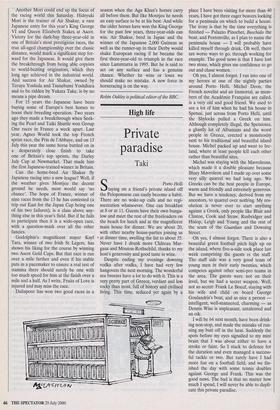The turf
Japanese challenge
Robin Oakley
As they watched a large, white, pyja- ma-clad karate expert ritually beating hell out of two smaller pyjama-clad figures whose function was merely to stand there and take the punishment, the faces of the world leaders assembled in Okinawa for the G8 summit last weekend were a pic- ture. Italy's Giuliano Amato peered ner- vously towards the exit as if he was going to be the next little guy to be picked on. France's President Chirac looked imperi- ously bored, as if somebody had invited him to consider the spectacle of two dogs copulating an entertainment. Tony Blair, wincing slightly as the blows landed, prac- tised his concerned, sympathetic look and then settled for a rictus of glazed admira- tion. He was probably wondering if the fellow handing out the bashing could spare a few Saturday nights to march drunken football hooligans to their cash- points. And, with not an eyelid flickering, Russia's Vladimir Putin merely looked impassive, as if he saw this sort of thing all the time. Once a KGB man, always a KGB man.
From all this political parade-ring detail you will gather that, for the last time before I leave the corporation, BBC duties were keeping me from my racing last weekend. On recent experience it did save me a further battering at the hands of the bookies. But then at least they smile as they hand out their punishment, although the odd ritual bow in appreciation of my efforts to fill their satchels might be nice.
One of the talking points of the Okinawa summit was the host prime minister's capacity for gaffes. Japanese journalists were giving 6-4 on that the man who had greeted his arrival in the job by suggesting his countrymen were a divine master race would drop another danger while the world's media were focusing hard. But favourites don't always come in and he didn't. We had to make do with the (possi- bly apocryphal) story about when he first went to meet President Clinton and was advised on how to play it, opening in English: 'You say "How are you?". He'll say "Fine, how are you", and you'll say "I am too".' Unfortunately Mr Mori allegedly slipped up on one tiny detail. He asked the President: 'Who are you?', got the reply `I'm Hillary's husband' and duly replied `Me too.' ► Another Mori could end up the focus of the racing world this Saturday. Hideyuki Mori is the trainer of Air Shakur, a rare Japanese entry for this year's King George VI and Queen Elizabeth Stakes at Ascot. Victory for the dark-bay three-year-old in one of Britain's most prestigious races, the true all-aged championship over the classic distance, would mark a significant step for- ward for the Japanese. It would give them the breakthrough from being able copyists to world-beating originators, which they long ago achieved in the industrial world. And success for Air Shakur, owned by Teruya Yoshida and Tsunebumi Yoshihara and to be ridden by Yukata Take, is by no means a pipe dream.
For 15 years the Japanese have been buying some of Europe's best horses to boost their breeding operation. Two years ago they made a breakthrough when Seek- ing the Pearl and Taiki Shuttle won Group One races in France a week apart. Last year, Agnes World took the top French sprint race, the Prix de l'Abbaye, and on 13 July this year the same horse battled on in a desperately close finish to take one of Britain's top sprints, the Darley July Cup at Newmarket. That made him the first Japanese-trained winner in Britain.
Can the home-bred Air Shakur fly Japanese racing into a new league? Well, if the weather gives Montjeu the decent ground he needs, most would say 'no chance'. The hope of France, winner of nine races from the 13 he has contested (a trip out East for the Japan Cup being one of his two failures), is a class above any- thing else in this year's field. But if he fails to participate then it is a wide-open race, with a question-mark over all the other fancies.
Godolphin's magnificent stayer Kayf Tara, winner of two Irish St Legers, has shown his liking for the course by winning two Ascot Gold Cups. But that race is run over a mile farther and even if his stable puts in a pacemaker to ensure a real test of stamina there should surely be one with too much speed for him at the finish over a mile and a half. As I write, Fruits of Love is injured and may miss the race.
Daliapour has won two good races in a season when the Aga Khan's horses carry all before them. But like Montjeu he needs an easy surface to be at his best. And while the older horses have won the King George for the past few years, three-year-olds can win. Air Shakur, bred in Japan and the winner of the Japanese 2,000 Guineas as well as the runner-up in their Derby would shake European racing if he became the first three-year-old to triumph in the race since Lammtarra in 1995. But he is said to act on any surface and has a genuine chance. Whether he wins or loses we should make no mistake. A new force in horseracing is on the way.
Robin Oakley is political editor of the BBC.



























































 Previous page
Previous page